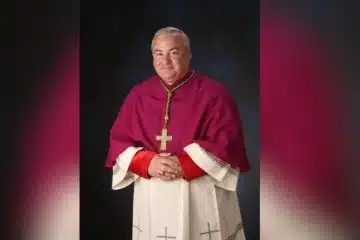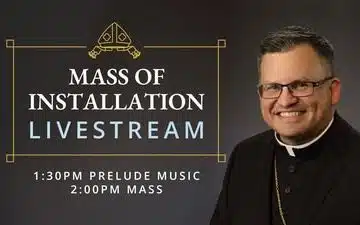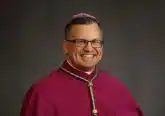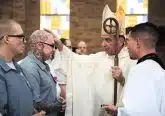Former Nobel prize nominee Bishop Gassis of Sudan visits archdiocese, talks human rights
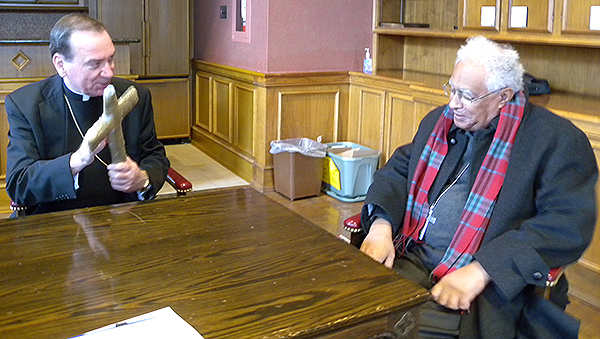
By Eileen Connelly, OSU
The Catholic Telegraph
Bishop Macram Max Gassis, a Comboni Missionary once proposed as a candidate for the Nobel Peace Prize, visited the archdiocese Feb. 15-17 to discuss his work as a human rights advocate in his home country of Sudan. His time in Cincinnati included a meeting with Archbishop Dennis M. Schnurr, a presentation and reception at the Comboni Mission Center and a Mass celebrated at Immaculate Heart of Mary Parish in Anderson Township.
Bishop Gassis of El Obeid, Sudan, has led a refugee’s life since 1988 when the Sudanese government brought criminal charges against him following his testimony before the U.S. Congress regarding the atrocities committed by that government against its own people. During a subsequent visit to the United States, the bishop was strongly urged not to return home for security reasons.
“I became a rebel among rebels,” Bishop Gassis said.
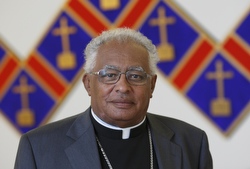
Since 1990, Bishop Gassis has traveled extensively from his headquarters in Nairobi, Kenya, throughout Europe and the United States to make known the tragic situation of the African population of the Sudan. He has often addressed the U.N. Commission on Human Rights in Geneva, Switzerland, and a number of other international human rights organizations.
Over the years, Bishop Gassis has been entrusted with the pastoral care of the Sudanese people in areas that are not under the control of the government of the Sudan. Currently, Bishop Gassis is the voice of the people of the Nuba Mountains who are victims of enslavement, air raids, forced starvation and rape at the hands of their government’s army as they struggle for independence. The bishop often travels to the mountains and provides emergency aid and medical assistance through the missionaries working there.
“The people are suffering. The situation is very grim,” Bishop Gassis told Archbishop Schnurr during their meeting, explaining that the government in Khartoum, capital of the Republic of Sudan, has orchestrated daily aerial assaults on civilian targets in the mountains in an attempt to ethnically cleanse the region. The sustained bombing has forced the people to take refuge in caves or in the banks of rivers. Destruction of their land has resulted in the inability to cultivate crops and “people are starving.” Many elderly residents, women and children have been injured or killed.
Bishop Gassis said Khartoum will never crush the spirit of the people.
“They are gentle people, but they are fighting for a cause to protect their ethnic group as Africans,” he said. “There is a lesson in this that all Africans, all peoples, deserve to live peacefully in unity and diversity.”
Disappointed by the response of the international community to the tragedy, Bishop Gassis finds hope in the courage of the people of the Nubu Mountains and the young missionaries, both priests and Sisters, who strive to bring them some relief.
“I look at them and tell them ‘you are my heroes,’” he said.
Bishop Gassis also spoke of the government’s “bigotry against anything Christian,” noting that the Sudanese army has vandalized Catholic churches by smashing tabernacles, breaking windows, destroying statues and writing vulgarities on walls of the structures.
“Political and military reasons aside, why destroy a church?” he asked with sadness in his voice.
Persistent in his efforts to raise international awareness of the tragedy, he has established the Bishop Gassis Sudan Relief Fund to raise money and support for vital relief projects, including building hospitals, schools, and wells. He urges local Catholics to “speak out, talk to your congressmen and pray,” in response.
“Prayer without action is dead, just as faith without action is dead,” he added. “We are the same church. We need to move together hand and hand and say to each other ‘these are my brothers and sisters who are suffering.’”


